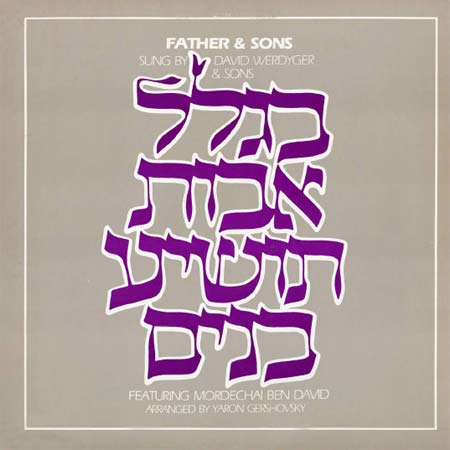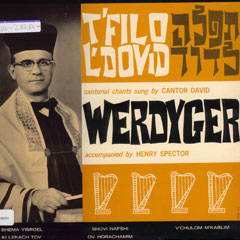David Werdyger (30 October 1919 – 2 April 2014) was a Polish-American Hasidic Jewish hazzan and solo singer who was considered one of the pioneers of 20th-century Jewish music.A Holocaust survivor who was incarcerated in several Nazi concentration camps, including the factory run by Oskar Schindler, Werdyger moved to Brooklyn, New York, after World War II and began recording albums featuring the music of the Bobov, Boyan, Skulen, Melitz, Radomsk, and Ger Hasidic dynasties, recording 60 albums in all. He also founded and operated a successful travel agency, Werdyger Travel, and established the Jewish record label, Aderet Records, now managed by his son Mendy. He was the father of popular Jewish singer Mordechai Ben David and the grandfather of Jewish singers Yeedle (Mordechai’s son) and Yisroel Werdyger (Mendy’s son).
Werdyger was the youngest of four sons and four daughters born to Yisrael Aryeh Werdyger, a well-to-do wholesaler of men’s shirts and dry goods and a prominent member of the Gerrer Hasidic community of Kraków (Cracow), to which the family moved shortly after David’s birth. The Werdyger family was known for its musical talent, and as a youngster, David’s singing ability was readily apparent. At the age of six he became the soloist in the choir of the Eizik Yeikeles Synagogue in Kraków, and at age 12 he was invited by Yankel Talmud, the leader of the Gerrer choir, to be a soloist in that choir in the town of Ger. On Rosh Hashana, he sang before the Gerrer Rebbe, the Imrei Emes, and thousands of Hasidim.
With the Nazi occupation of Poland in September 1939, Werdyger was subject to frequent arrests and forced labor on the streets of Kraków. In the summer of 1940, when the Nazis ordered all Jews to leave the city, Werdyger’s family moved to an uncle’s home in Proszowice. In response to rumors of a mass deportation, David, his unmarried sister Yettie, and his parents went into hiding with 16 others in a bunker in their uncle’s warehouse, where they were cared for by a Polish employee. Three weeks later, they sneaked into the Podgórze ghetto of Kraków. From there, his parents bought their way out of the ghetto into Sosnowice, where one of their married daughters was living. David never saw them again.
In the ghetto, David worked in forced labor battalions, and when a mass deportation took place in the Podgórze ghetto, he went into hiding with 15 others. Two weeks later, his group was ferreted out of their hiding place and taken with 180 other ghetto residents to the Kraków-Płaszów concentration camp to be shot by firing squad. Each man passed before German Nazi camp commandant Amon Göth; when it was David’s turn, Göth asked him what type of work he did. “I am a professional singer, and I have a trained soprano voice,” Werdyger replied. “Would you like to hear something?” Momentarily taken aback, Göth replied, “Sing the song you Jews chant when you bury your dead.” Werdyger began singing the traditional Jewish prayer for the dead, El Molei Rachamim (“God, Full of Compassion”), with great feeling and power, ending with a thunderous “Amen.” His voice so moved Göth that the commandant directed him to the camp rather than to the firing squad; he was one of the 40 men saved from execution that day.
Werdyger was an inmate in the Płaszów for five months, after which he was transferred to the nearby factory under the direction of Oskar Schindler. He also spent time in the Mauthausen-Gusen concentration camp and the Linz labor camp, where he was liberated on Saturday, 5 May 1945.
After the war, Werdyger found his eldest brother, Yaakov Meir, and youngest sister, Yettie, still alive. He traveled to Makow to attend Yaakov Meir’s wedding and was there introduced to Malka Godinger (1923–1980), daughter of Meir Godinger. They married shortly after. Several months later Werdyger and his wife left for Paris, France, where their first son, Yisrael Aryeh, was born. Four years later, in February 1950, they sailed to New York.
The couple had three more sons in America: Mordechai (born 1951), Chaim (born 1954), and Mendel (Mendy) (born 1959). Werdyger encouraged his four young sons to sing with him in the recording studio and in concert.Mordechai began calling himself by his Hebrew patronymic, Mordechai Ben David, when he launched his solo singing career in the 1970s.
Upon arrival in New York, Werdyger began working as a hazzan in the Warshever Shul on Rivington Street; after a year he moved to the Chasam Sofer Shul on the Lower East Side. His fame as a hazzan spread, and he signed a contract with the New Lots Talmud Torah Shul, which was famous for the high-caliber hazzanim that it attracted. Within a few months of this appointment, he began receiving invitations to appear in concert, and he performed before audiences of thousands in Chicago, Philadelphia, Pittsburgh and other cities. He also started training with a voice coach, who taught him how to create his own cantorial compositions. During this time he also opened Werdyger Travel in Brooklyn.
Later, Werdyger moved to the Rabbi Meir Simcha Hakohein Shul in East Flatbush, headed by Chabad Rabbi Jacob J. Hecht. Rabbi Hecht tapped him to sing cantorial selections on his weekly radio program, Shema Yisrael, which exposed Werdyger to even larger audiences. Rabbi Hecht also advised him to make a record. In 1959, Werdyger went to a professional recording studio to record his first record, Tefillah L’David, which sold out its first production. In 1960, Werdyger recorded another album, Mizmor LeDavid, which was also favorably received.
After that, Werdyger started his own recording label, Aderet Records, to record Hasidic niggunim (melodies) which were unknown to non-Hasidic religious Jews in America. He asked Yankel Talmud to provide him with the best Gerrer melodies and released Songs of the Gerer Chassidim Loi Sevoishi in 1962. His next album, A Melitzer Oneg Shabbos, introduced Melitzer niggunim, including several tunes composed by the Melitzer Rebbe, Rabbi Yitzchak Horowitz, whom Werdyger met while vacationing in Miami. Werdyger’s third album, A Gerer Melava Malka, featuring a solo by his young son, Mordechai, sold over 30,000 copies. Subsequently, Werdyger recorded the niggunim of the Skulener Rebbe, Rabbi Eliezer Zusia Portugal, on Skulaner Chassidic Nigunim Vol. 1 and Skulaner Nigunim 2, and of the Bobover Rebbe, Rabbi Shlomo Halberstam, on Bobover Niggunim.
Werdyger’s successful albums led to concert appearances in the United States, Canada, and England, in which he sang both cantorial and Hasidic melodies. Unsure of how his repertoire would be received at a yeshiva benefit concert in London, he requested accompaniment by a boys’ choir. Forty boys accompanied him, and he discovered the value of adding child vocalists and soloists to his music. Thereafter, he produced an album for the Boyaner Hasidim on which he and his son Mordechai sang together, accompanied by the Boyaner’s men’s choir
Werdyger continued to sing on albums produced by Aderet Records, including two Shabbos with the Werdygers collections produced by his son, Chaim. In 1997, he contributed cantorial renditions for the PBS documentary A Life Apart: Hasidism in America.
Following the death of his wife in 1980, Werdyger remarried Sarah Wercberger, widow of Wolf Wercberger and daughter of Rabbi Osher Zelig Marton, a dayan and shochet in pre-war Romania.
In 1993 Werdyger published his autobiography, Songs of Hope, as part of the Holocaust Diaries series published by CIS Publishers.[33]
He died on 2 April 2014 at the age of 94.
16 Songs Performed by David Werdyger
-
Bigal2:44
-
Chemdas3:09
-
Instrumental3:26
-
Ki B'simchoh3:02
-
Ki Lekakh Tov5:09
-
Ki Loi Noeh3:30
-
Mi Sheberakh4:06
-
Ov Horakhamim10:05
-
Ovinu3:02
-
Rich Man3:22
-
Shema Yisroel5:18
-
Shuvi Nafshi5:24
-
Take The Time4:48
-
Tov Lehodot3:05
-
V'khulom Mkablim5:01
-
Yedid Nefesh3:26




